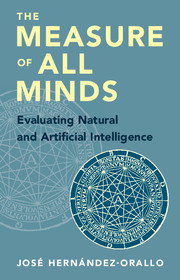Book contents
- Frontmatter
- Contents
- List of Panels
- Preface
- PART I A LONG-PONDERED OUTFIT
- PART II THE EVALUATION DISCORDANCE
- PART III THE ALGORITHMIC CONFLUENCE
- PART IV THE SOCIETY OF MINDS
- 12 Cognitive Development and Potential
- 13 Identifying Social Skills
- 14 Communication Abilities
- 15 Evaluating Collective and Hybrid Systems
- PART V THE KINGDOM OF ENDS
- References
- Index
- Plate section
13 - Identifying Social Skills
from PART IV - THE SOCIETY OF MINDS
Published online by Cambridge University Press: 19 January 2017
- Frontmatter
- Contents
- List of Panels
- Preface
- PART I A LONG-PONDERED OUTFIT
- PART II THE EVALUATION DISCORDANCE
- PART III THE ALGORITHMIC CONFLUENCE
- PART IV THE SOCIETY OF MINDS
- 12 Cognitive Development and Potential
- 13 Identifying Social Skills
- 14 Communication Abilities
- 15 Evaluating Collective and Hybrid Systems
- PART V THE KINGDOM OF ENDS
- References
- Index
- Plate section
Summary
There be three degrees of this hiding and veiling of a man's self. The first, closeness, reservation, and secrecy; when a man leaveth himself without observation, or without hold to be taken, what he is. The second, dissimulation, in the negative; when a man lets fall signs and arguments, that he is not, that he is. And the third, simulation, in the affirmative; when a man industriously and expressly feigns and pretends to be, that he is not.
– Francis Bacon, Essay on “Simulation and Dissimulation” (1718)EVOLUTION INVOLVES SEVERAL organisms and species struggling for resources. The resulting ecosystems foster environmental changes for which adaptation is required. If real environments include other agents, and several types of interaction, from competition to co-operation, should not evaluation tasks be social by also including these agents and interactions? However, by including other agents in a test, their evaluation becomes dependent on the other agents’ abilities and their interaction in such a multi-agent system. While this looks circular, it can be turned into a recursive population-based approach, much like evolution has done. But social skills can also be seen in terms of the policy acquisition process as introduced in Part III of the book and the developmental perspective of the previous chapter. Different degrees of ‘mindmodelling’, imitation, manipulation, learning by demonstration and even self-modelling can be understood – and, eventually, measured – in this way.
WHAT IS DISTINCTIVE ABOUT SOCIAL CONTEXTS?
Social contexts are characterised by the existence of relevant interactions with other agents (conspecifics or not). Behaviours seem to be very different in these scenarios, since appropriate actions must contemplate what other agents are doing or are expected to do. More precisely, there is a continuum of contexts, being more or less social. For instance, giant pandas follow a solitary life and barely interact with their conspecifics (except for mating or marking their territory).
- Type
- Chapter
- Information
- The Measure of All MindsEvaluating Natural and Artificial Intelligence, pp. 341 - 369Publisher: Cambridge University PressPrint publication year: 2017

